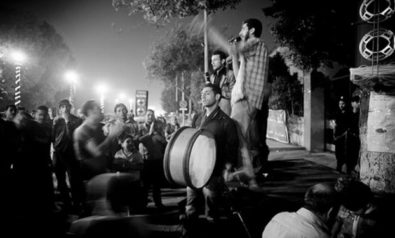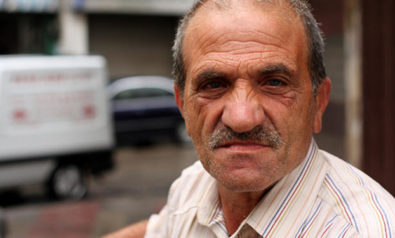This article is part 4 of a multi-part series exploring Tripoli, Lebanon. The series is based on Nicholas A. Heras’ extensive experiences in the city between 2006 and 2011, and the continuing lessons its residents have given him. This is the fourth of seven parts. Tripoli is a city of taxis. The city, like many other areas of Lebanon outside Beirut, struggles to provide reliable public transportation for its residents. Tripolians, as a result, must turn either to their family’s vehicle, walk, or to the ever-growing fleet of private, hyper-competitive taxi drivers to go about their daily routine. Tripoli’s taxi drivers are, in the routes they service and in the areas of the city they refuse to drive to, an effective GPS to guide the traveler to or away from the economic, sectarian, and political fault-lines that run throughout the city. These shatter points in Tripoli's sustainable social cohesion are more numerous than the famous firing-line that divides the neighborhoods of Bab Al-Tabbaneh and Jebel Mohsen. Take a Taxi: Tripoli’s Public Transportation Taxis are widely viewed in Tripoli as the city’s fastest, generally safest, and cheapest transportation option. As the cost of benzene (fuel for vehicles) rises with the cost of living in Lebanon, many Tripolians are keeping their cars parked at home and turning to taxis to move about. The cost of a taxi is low in Tripoli (typically less than $1 per passenger per ride), and most taxi drivers will take their passengers to any point in the city from any other point in the city, and even slightly beyond the city’s limits, for this fare. Taxi passengers can ask for one of two general types of service, shared or private. Private taxis typically cost $2 per person. Participation in Tripoli’s taxi culture is bolstered by this choice of shared or private taxi service. The unspoken agreement between taxi drivers and passengers is that by travelling alone in a shared taxi, the route will be longer as the driver seeks to fill all the seats in the taxi en route to each destination. Individuals in a rush can choose the private taxi option, and the taxi driver will oblige their time constraints by speeding directly to the destination. Shared taxis are also appealing to many of the city’s families. Families that are traveling together are able to claim the shared taxi cost per passenger. Taxi transportation is thus a reliable alternative to the cost of purchasing, maintaining, and fueling a private vehicle for many of the city’s poor and working class families. First-time or infrequent travelers to Tripoli would be forgiven to believe that the city’s taxi service is a chaotic conflict of drivers seeking to maximize their profits from any random pedestrian waiting or walking along the road. In actuality, Tripoli’s taxi drivers have created and adhere to a formal system of resource allocation, by attracting passengers. Taxis in the city are divided into two “categories”: stopped or passing. Stopped taxis are parked daily at specific public places in Tripoli and generally take passengers to points outside of the city, while passing taxis drive around the city and generally take passengers to points inside the city. Taxi Sociology: Mapping Socio-Political and Economic Divides in Tripoli Stopped and passing taxi services perform a different social function. Although it is a relatively small city in physical size, Tripoli is composed of three semi-autonomous neighborhood clusters: the seaside Al-Mina district, the central district around the Old City’s Souq, and the northern hill neighborhoods of Beddawi, Bab Al-Tabbaneh, Jebel Mohsen, Abi Samra, and Ibbe. While all of these areas are part of “Tripoli,” in practice they are enclaves unto themselves, linked to each other and traversable by residents of the other areas, but maintaining significant distinction between each other. Stereotypes about these areas are common in the city. The Al-Mina district is popularly considered to be Tripoli’s richest and most desirable neighborhood, with the city’s best dining and shopping options. Central Tripoli around the Old Souq is considered sleepy and residential;,a crowded and exhaust-filled tourist trap at the worst times during the day, and a welcoming and authentic place to spend a lazy evening before retiring to one’s home. The northern districts of Tripoli, especially Bab Al-Tabbaneh and Jebel Mohsen, are referred to as the “war zone,” and are derided as poverty-stricken, sectarian hate-filled, and socially backward. The stereotypes about these areas influences taxi service to them. Many taxi drivers, stopped or passing, will refuse to drive directly from the Al-Mina or central districts of Tripoli to its northern neighborhoods. Instead, passengers from the northern areas of the city will have to transfer two or three times before arriving in their neighborhood, driving up the cost of their one-way ride from an affordable, less than a $1, trip to an unaffordable $3 trip. The burden placed upon residents from Tripoli’s northern neighborhoods is made heavier by the fact that many of these residents work in low-paid menial positions in the numerous stores and homes in the Al-Mina District, which is the furthest point inside of the city from its northern areas. Free Flow of Speech: Brutal Honesty in Tripoli’s Taxis The social demography of Tripoli’s economic, sectarian, and political divisions have been inculcated into its taxi culture. In spite of this situation, the taxis in the city do serve an important function in encouraging greater social interactions amongst Tripoli’s residents. Conversation in many taxis in Tripoli is usually frank and focused on the city’s social issues. Tripolians are extremely concerned with several lingering, existential threats that stalk their city. The two most voracious of these is the economic stagnation that is dragging many of the city’s population into deeper poverty and endemic frustration at, and increasing apathy with, municipal authorities of Tripoli and the national political leaders in Beirut. These implicit, daily worries are the topic of normal and boisterous discussion in Tripoli’s taxis. Many Tripolians view the taxis they ride in as a great venue to state their opinions openly in a public forum that has the atmosphere of an invite-only debate club. Often-times fellow passengers and the taxi drivers themselves will join in the conversation. The resulting interaction is a collegial atmosphere of mutual commiseration with the failing local economy, deteriorating sense of civic pride in the city, and dark humor at the expected failings of Lebanon’s politicians. Tripolian passengers especially love to poke fun of their political leaders. Taxis in Tripoli are honest sites for social interaction between residents moving from one neighborhood of the city to another, and are the one consistent vehicle for immediate social equality in the city. Rich, poor, religious, political, Lebanese, foreigner; these terms lose their menace inside the taxi. There is only the “driver,” the “passenger,” and the road until the destination. All must pay the fare to enter, and all must leave their political and sectarian prohibitions at the door once they are inside and the taxi is moving. The taxi driver is the za'im (traditional political leader, in Lebanon) and the passengers do well to remember that. Tripoli’s reputation for being a hotbed of politicized sectarianism and economic deterioration, battles intensely with its tourist image as a living and quaint reminder of Lebanon and the wider Middle East’s social past. With the outbreak of the Syrian uprising, the exacerbation of the traditional Sunni Muslim and Alawite sectarian hostility in the environs of Bab Al-Tabbaneh and Jebel Mohsen, and the increase of anti-Bashar al-Assad political mobilization in and around the city, Tripoli has become an international parable of instability. Many Tripolians are affected by these developments and suffer from a gripping sense of despair for their future. There are signs of hope, however. The simple equality, free speech, and sense of shared civility by the drivers and passengers of many of Tripoli’s taxis is one of the numerous examples of hope for lasting civic peace in the city. Read part five of Nicholas A. Heras' multi-part series exploring Tripoli, Lebanon, on July 12. The views expressed in this article are the author's own and do not necessarily reflect Fair Observer's editorial policy.
Support Fair Observer
We rely on your support for our independence, diversity and quality.
For more than 10 years, Fair Observer has been free, fair and independent. No billionaire owns us, no advertisers control us. We are a reader-supported nonprofit. Unlike many other publications, we keep our content free for readers regardless of where they live or whether they can afford to pay. We have no paywalls and no ads.
In the post-truth era of fake news, echo chambers and filter bubbles, we publish a plurality of perspectives from around the world. Anyone can publish with us, but everyone goes through a rigorous editorial process. So, you get fact-checked, well-reasoned content instead of noise.
We publish 3,000+ voices from 90+ countries. We also conduct education and training programs
on subjects ranging from digital media and journalism to writing and critical thinking. This
doesn’t come cheap. Servers, editors, trainers and web developers cost
money.
Please consider supporting us on a regular basis as a recurring donor or a
sustaining member.
Will you support FO’s journalism?
We rely on your support for our independence, diversity and quality.









Comment